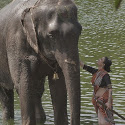| (c) Filmbüro Baden-Württemberg |
| (c) Filmbüro Baden-Württemberg |
While Ira was connecting the dots about how the deterioration of Appa’s memory occurred, Appa on the other side was living in his present mental state happily. From the car he followed the elephant Mahut with his small daughter & Lakshmi to their tent beside a pond. Like a nagging baby crawls to its mother for food, similarly Appa was crying and reluctant to go back to his home even after several tries by the tramp couple instead he pointed out their tent as his home. Appa was joyfully playing with the small daughter, sleeping on Lakshmi’s tummy hearing the lullabies sung by Mahut’s wife forgetting all his self identity and relationships. Yes he had lost all his memories suffering from Dementia but he kept enchanting the Mantra’s from Bhagvad Gita and remembered all the stories of Kalidasa’s Meghdoot. The tramp couple considered Appa as a learned personality, another incarnation of GOD. The Mahut’s wife had accepted Appa as their third baby and agreed to take him along to their next destination. Realising the instant care and intuitive empathy from Channama, Appa calls her Mother.
| (c) Filmbüro Baden-Württemberg |
„So be it“ – One needs to accept what life has in store for us patiently. Life is a cycle where every being in this cosmos has to pass the phases of creation, preservation and destruction. The reason why meditation is necessary for one is to bring an automatic balance when one’s life trespasses through different phases of transformation. So other than the cognitive knowledge, it is really important to deepen the sensory knowledge inside us. Though Ira and her family is highly educated and looks after her aged father knowing the fact that a child’s duty to its parents continue till the crematorium, she fails to adapt herself to the changing phases of Appa’s mental health. On the other hand Ante and Channama, the tramp couple without any theoretical knowledge is much more enlightened in their intuition. Despite their utter poverty, Channama becomes so hospitable and reacts to each of Appa’s childish behaviour so well that Appa feels home in their dilapidated tent. The lessons from Astu will be to learn to accept things the way they are and adapt ourselves if you want peace in life.
Tranquillity in life will be achieved by practising:
„asato mā sadgamaya tamasomā jyotir gamaya mrityormāamritam gamaya Oṁ śhānti śhānti śhāntiḥ“ – „From ignorance, lead me to truth; From darkness, lead me to light; From death, lead me to immortality“ – Upanishad
theinder.net had the opportunity to talk to Dr. Mohan Agashe about „Astu“ and his upcoming projects. The video interview will follow soon.

